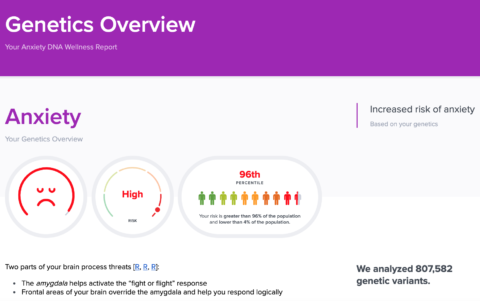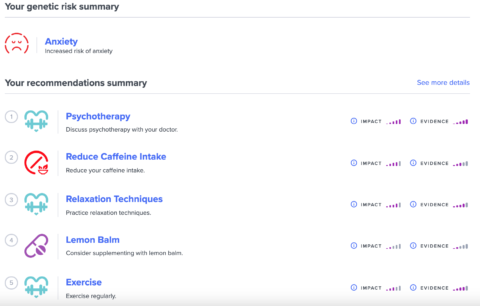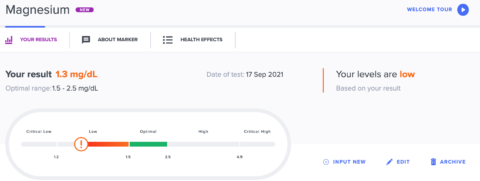
Over 40 million Americans suffer from an anxiety disorder. If you’re one of them, you may have asked yourself what you can do to ease your symptoms. There are many things you can do to improve your mental health – a magnesium supplement is one of them. But how can magnesium help with anxiety? Read on to find out what are the benefits of magnesium for anxiety, and if it’s right for you.
What is magnesium?
Magnesium is an essential mineral that your body needs to function. It plays a role in many processes throughout the body including energy production, DNA synthesis, muscle and nerve function and much more. It’s often found in laxatives and antacids.
Magnesium isn’t made in the body so it has to be eaten. It can be found in a variety of foods, but the highest amounts are naturally found in nuts and green leafy vegetables. If you are active you may want to take in more magnesium, as levels are depleted during physical activity. Magnesium uptake also starts to decline the older we get.
Does magnesium help with anxiety?
Recent research suggests that magnesium is particularly important for brain health as it plays a role in maintaining the function of neurotransmitters which send messages in the brain and body. In particular, magnesium is thought to affect a brain region known as the hypothalamus, which is involved in the regulation of stress.
Undoubtedly, there is a connection between magnesium and anxiety. As a result, it’s no great surprise that magnesium has potential to be a great natural way to treat anxiety.
A review which looked at natural anxiety treatments carried out in 2010 identified that you might see benefits from taking magnesium for anxiety. A 2017 review of more than 15 scientific studies investigating several types of anxiety from mild anxiety to generalized anxiety disorder also identified that magnesium reduced anxiety, but it’s worth bearing in mind that further larger scale studies are required to confirm these findings.
Best magnesium for anxiety
What is the best magnesium for anxiety? Well, typically magnesium is combined with another type of substance to make it more digestible. Currently, there has not been significant research as to which is the best form of magnesium for anxiety, but preliminary studies which showed that magnesium was able to benefit anxiety used magnesium lactate and magnesium oxide.
Some natural magnesium sources include avocados, nuts and seeds, dark leafy greens, and whole grains.
Magnesium dose for anxiety
The daily Recommended Dietary Allowances for magnesium are as follows:
- 19-30 years – 400 mg for men and 310 mg for women
- 31 and older – 420 mg men and 320 mg women.
However, the optimal level will differ from person to person, dependent on factors such as how well their body absorbs minerals.
These recommendations may change for pregnant or breastfeeding women so discuss this with your physician before supplementation.
Many people have low magnesium levels. In fact, almost half of the US population consumes less than the required amount of magnesium. Early signs of magnesium deficiency include loss of appetite, nausea, vomiting, fatigue, and weakness.
As deficiency worsens, numbness, tingling, muscle contractions and cramps, seizures, personality changes, abnormal heart rhythms, and coronary spasms can occur. Severe deficiency can result in hypocalcemia or hypokalemia (low blood calcium or potassium levels, respectively) because mineral balance is disrupted.
Magnesium supplement side effects
Taking magnesium orally is likely safe for most people when taken in tolerable doses. In some cases, magnesium may cause nausea, vomiting, stomach upset, diarrhea, and other side effects.
Extra benefits of magnesium supplements
Beyond its ability to help with anxiety, magnesium supplementation has also been touted to benefit the following:
- Sleep
- Pain
- Constipation
- Migraines
- Type 2 diabetes risk
- Decreased blood pressure
- Mood
How SelfDecode can help with anxiety
Whilst making sure you are getting enough magnesium either in your diet or by supplementing can go a long way to promoting healthy magnesium levels, actually, it’s your genes which ultimately determine how well your body is able to utilize magnesium that may have the biggest impact.
SelfDecode offers a wide range of DNA health reports complete with personalized recommendations to identify how you can counteract any genes which may be impacting things like your ability to utilize magnesium or your propensity to be anxious.
SelfDecode even offers a specialized Anxiety Wellness Report designed to analyze genetic variants related to anxiety and provide personalized recommendations.
SelfDecode is not meant to be used as a diagnostic tool. Rather, these reports can tell you about your genetic predisposition to anxiety and other health conditions. Still, it’s always recommended that you consult with your doctor if you think you’re suffering from anxiety.
Anxiety report
As well as being able to identify how well your body utilizes magnesium, SelfDecode’s Anxiety Wellness Report outlines a range of genes which have known associations with anxiety and identify whether you carry any anxiety risk genes.
SelfDecode analyzes over 800,000 genetic variants to give your genetic risk score and personalized recommendations to help you counteract the negative effects of your genes.
These associations are backed up using scientifically valid studies, all of which are easily accessible by links embedded within the report.
Again, the report also provides you with a comprehensive list of personalized recommendations to counteract any anxiety inducing genes you may carry.
Lab Test Analyzer
Lab Test Analyzer allows you to identify whether your magnesium blood levels are actually optimal. Optimal isn’t a term often used by medical professionals and should you have your blood tested for magnesium you will simply be told whether or not it falls within the ‘normal’ range. However, it doesn’t take a genius to work out that normal is not the same as optimal.
So again if you’re concerned your magnesium status may be contributing to your anxiety consider checking whether your magnesium levels are optimal at Lab Test Analyzer.
Conclusion
Magnesium is a really important mineral within our body, but almost half of the US population consumes lower than the RDA. Research shows that magnesium is particularly important for brain health, so not surprisingly decreased magnesium status has also been associated with an increased anxiety risk, so consider checking whether your magnesium levels are optimal at Lab Test Analyzer.
It’s prudent to understand how well your body is actually able to process the magnesium you intake before you find the best magnesium supplement for anxiety that fits your needs. The best way to find this information out is by using a tool like SelfDecode to identify whether your genes which process magnesium are functioning optimally.
In this article, we explained the connection between magnesium and anxiety. But, if it turns out that magnesium isn’t your problem, then it may be worth investigating other genes linked to anxiety to find out whether they could be the root of the problem, and use targeted personalized recommendations to take anxiety busting action.
Related Articles
- Is anxiety genetic? How DNA tests for anxiety can help you
- Stress vs Anxiety: What’s the difference?
- Purple Passionflower and Anxiety: Can It Help You Calm Your Mind?
- Caffeine And Anxiety: What Do Your Genes Have To Say?
- How to Deal with Anxiety using a Gene-based Approach






